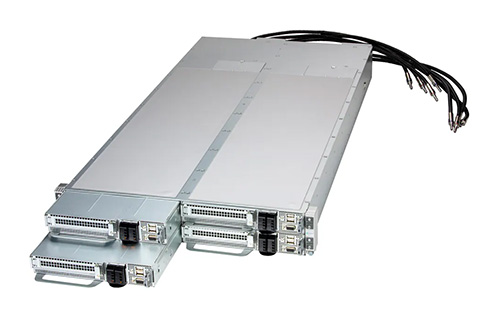Supermicro BigTwin® servers Articles
Supermicro FlexTwin now supports 5th gen AMD EPYC CPUs
- November 6, 2024
- Author: Peter Krass
FlexTwin, part of Supermicro’s H14 server line, now supports the latest AMD EPYC processors — and keeps things chill with liquid cooling.
Which media server should you use when you absolutely can’t lose data?
- April 24, 2024
- Author: KJ Jacoby
A new Linus Tech Tip video shows a real-world implementation of Supermicro storage servers powered by AMD EPYC processors to provide super-high reliability.
Supermicro expands rack capacity so you get servers faster & greener
- November 20, 2023
- Author: Peter Krass
Supermicro recently announced that it has expanded its capacity and can now provide 5,000 fully integrated, liquid-cooled racks per month.
Can liquid-cooled servers help your customers?
- August 11, 2023
- Author: Peter Krass
Liquid cooling can offer big advantages over air cooling. According to a new Supermicro solution guide, these benefits include up to 92% lower electricity costs for a server’s cooling infrastructure, and up to 51% lower electricity costs for an entire data center.
Tech Explainer: Green Computing, Part 3 – Why you should reduce, reuse & recycle
- July 19, 2023
- Author: KJ Jacoby
The new 3Rs of green computing are reduce, reuse and recycle.
Tech Explainer: Green Computing, Part 2 — Holistic strategies
- June 23, 2023
- Author: KJ Jacoby
Holistic green computing strategies can help both corporate and individual users make changes for the better.
How ILM creates visual effects faster & cheaper with AMD-powered Supermicro hardware
- May 22, 2023
- Author: KJ Jacoby
ILM, the visual-effects company founded by George Lucas, is using AMD-powered Supermicro servers and workstations to create the next generation of special effects for movies and TV.
Supermicro H13 Servers Maximize Your High-Performance Data Center
- November 18, 2022
- Author:
The modern data center must be both highly performant and energy efficient. Massive amounts of data are generated at the edge and then analyzed in the data center.
Single-Root I/O Virtualization Delivers a Big Boost for Performance-Intensive Environments
- September 28, 2022
- Author: David Strom
CERN Parses Hadron Collider Data with 900 Supermicro Computers and AMD CPUs
- September 15, 2022
- Author: David Strom
CERN is trying to discover what happened in the nanoseconds following the Big Bang that created all matter. It is manipulating data flows with custom AMD circuitry that slices up the Large Hadron Collider data into smaller pieces. “You need to get all the data pieces together in a single location because only then can you do a meaningful calculation on this stuff,” said Niko Neufeld, a CERN project leader. The effort entails rapid data processing, high-bandwidth access to lots of memory and very speedy I/O among many servers.











